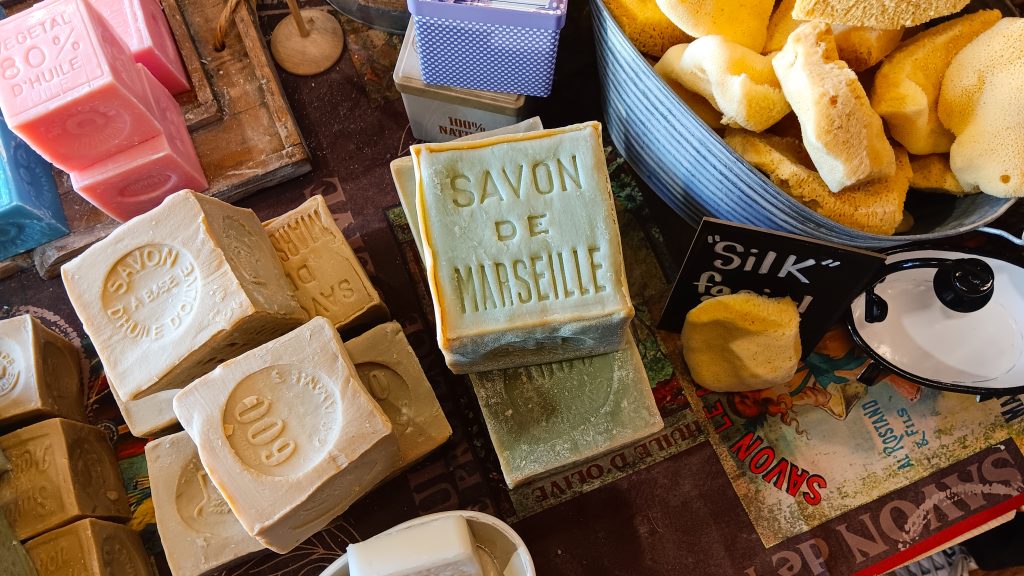
Among La Jolla Village boutique businesses, there is one that stands out as truly unique and distinctive: Au Savon de Provence.
Owner Francois Xavier is a purveyor of “Marseille soap” or “Savon de Marseille,” a traditional hard soap made for centuries from vegetable and olive oils produced around Marseille, a French Mediterranean port city.
On their website at ausavondeprovence.com, Xavier and his wife Lydia state that they moved from France to La Jolla to start their small family business selling French soaps in a unique gift store setting. Their product, “Le Savon de Marseille” (The soap of Marseille), comes in a cube shape embossed on all six faces. It is made with only four ingredients: freshwater, sea salt, natural lye, and natural vegetable oil. The French soap is anti-bacterial, hypoallergenic, biodegradable, and economical.
“We’ve (French) made this soap for 600 years now and there are no chemicals in it,” noted Xavier of his soap product.
Why buy Marseille soap? “Because it’s very good for the skin,” replied Xavier noting that his green-colored cubed French soap “gets very good results for people with eczema, psoriasis (a chronic skin condition) and dry skin.”
Even accessories in Au Savon de Provence, like sea sponges which are free of bacteria inside, are natural and organic. But soap is not the only product sold in the boutique. Also on display and for sale are accessories including fragrances for men and women, table cloths from Nice, France, exfoliators, loofahs, bath and Epsom salts, scrub and shaving brushes, soap containers, and dispensers.

French soaps in the boutique are $8 each or four for $30, while cubes are $9 each or four for $34 and body washes are $18 each or two for $32. Soaps can also be ordered on the store’s website. “We have (soap) 100% organic products for babies too,” added Xavier.
Xavier learned his craft studying under a soap master in France and he is the only one marketing the native French soap product in San Diego and Riverside counties.
How Xavier got involved with French soap is an interesting tale. “I’ve always been interested in natural stuff,” he said adding a friend of his wife’s first introduced him to Marseille soap, a factory, which was 10 minutes from his home. “So we went, and when I arrived in the shop of this company, it was like a revelation,” Xavier said adding someone told him, “You know what you want to do now.” And I said, “Yes. So I spent two years with a soap master to learn the process.”
AU SAVON DE PROVENCE
Where: 935 Prospect St .
Info: ausavondeprovence.com, 951-464-8821.
HISTORY OF MARSEILLE SOAP – Originally, big blocks of gentle soap were first crafted in the Mediterranean with olive oil from local groves, marine ash, and seawater, all widely available. In 1688, under King Louis XIV of France, the first regulations concerning the production and the brand-naming of soap were introduced limiting the use of the name “Savon de Marseille” to olive oil-based soaps with no-fat animal additives made according to certain ancient methods (heating in great cauldrons). Only manufactured in and around the Marseille area, these soaps are made according to certain ancient methods and bear the important mark “Savon de Marseille.”
The early 1900s brought the arrival of synthetic soaps and detergents and the spread of washers made the beginning of the decline of soap of Marseille. By 1913, production had reached 180,000 tons, and in 1924 there were 132 soap-making companies in the Marseille and Salon-de-Provence areas combined. However, fewer than five soap makers still craft Marseille soap according to the centuries-old tradition. But now, this special soap is being rediscovered for its natural and ecological values and its beneficial virtues compared to chemical soaps.













Discussion about this post